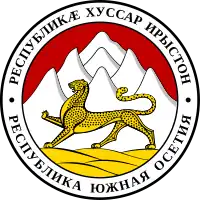Leonid Tibilov
Leonid Kharitonovich Tibilov (Ossetian: Тыбылты Харитъоны фырт Леонид, romanized: Tybylty Xarithony fyrt Leonid; Russian: Леонид Харитонович Тибилов; Georgian: ლეონიდ თიბილოვი; born 28 March 1951) is a South Ossetian politician who served as the President of South Ossetia from 2012 to 2017 after winning the 2012 South Ossetian presidential election.
Leonid Tibilov | |
|---|---|
.jpeg.webp) Tibilov in 2012 | |
| 3rd President of South Ossetia | |
| In office 19 April 2012 – 21 April 2017 | |
| Prime Minister | Vadim Brovtsev Rostislav Khugayev Domenty Kulumbegov |
| Preceded by | Vadim Brovtsev (Acting) |
| Succeeded by | Anatoliy Bibilov |
| Personal details | |
| Born | 28 March 1951 Verkhny Dvan, South Ossetian AO, Georgian SSR, Soviet Union[1] (now South Ossetia) |
| Political party | Independent |
Career
Leonid Tibilov headed the South Ossetian KGB as South Ossetia's Security Minister from 1992 to 1998.[2] He was then a first deputy prime minister and co-chaired a Georgian-Ossetian peacekeeping commission.[2] Tibilov stood at the 2006 presidential election losing to Eduard Kokoity, who won 98% of the vote.[3]
Before the 2012 election Tibilov distanced himself from the outgoing President Kokoity.[4] Tibilov is reported to be subservient to Russia and pledged to consult Russia before appointing a government if he was successful at the election.[4]
In the first round of the 2012 Presidential election, Tibilov received 42.5% of the vote to lead David Sanakoyev.[5] In the second round, Tibilov was elected president with 54.1% of the vote.[6]
In a move towards integration with the Russian Federation, Tibilov proposed in December 2015 a name change to "South Ossetia–Alania" in analogy with "North Ossetia–Alania", a Russian federal subject. Tibilov furthermore suggested holding a referendum on joining the Russian Federation prior to April 2017, which would lead to a united "Ossetia–Alania".[7] In April 2016, Tibilov said he intended to hold the referendum before August of that year.[8][9] However, on 30 May, Tibilov postponed the referendum until after the presidential election due in April 2017.[10] At the 2017 South Ossetian name change referendum, nearly 80 percent of those who voted endorsed the name-change, while the presidential race was won by Anatoly Bibilov – against the incumbent, Tibilov, who had been supported by Moscow and who, unlike Bibilov, was ready to heed Moscow's wish for the integration referendum not be held any time soon.[11] However, Bibilov posteriorly also stated that a referendum would probably be done in 2017, although he still said that it could be postponed.[12]
References
- "South Ossetia to hold new round of voting". Vestnik Kavkaza. Retrieved 8 April 2012.
- "Q&A: South Ossetian separatist presidential election". BBC News Online. 22 March 2012. Retrieved 8 April 2012.
- "Third Attempt to Elect New Leader in Breakaway S.Ossetia". Civil Georgia. 24 March 2012. Retrieved 8 April 2012.
- Tsvetkova, Maria (26 March 2012). "Ex-KGB chief leads South Ossetia presidential race". Reuters. Retrieved 8 April 2012.
- "Former KGB chief wins South Ossetia". The Telegraph. 9 April 2012. Retrieved 31 March 2013.
- "Ex-KGB man wins South Ossetia presidential election". Reuters. 9 April 2012. Retrieved 9 April 2012.
- "Breakaway Tskhinvali proposes name change". Agenda.ge. 29 December 2015. Retrieved 29 December 2015.
- "South Ossetia profile – BBC News". BBC. 21 April 2016. Retrieved 12 June 2016.
- "President: South Ossetia plans to hold referendum on becoming part of Russia before August". TASS. Retrieved 24 April 2016.
- Fuller, Liz (30 May 2016). "South Ossetia Postpones Referendum on Accession To Russian Federation". RadioFreeEurope/RadioLiberty. Retrieved 30 May 2016.
- Fuller, Liz (11 April 2017). "South Ossetia's Bibilov Wins Election, Puts Moscow in a Bind". Radio Free Europe/Radio Liberty. Retrieved 12 April 2017.
- "Референдум о вхождении Южной Осетии в Россию могут отложить, заявил Бибилов" (in Russian). RIA Novosti. 2 June 2017.
